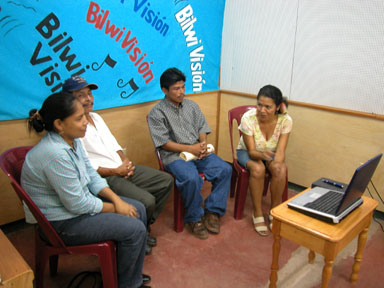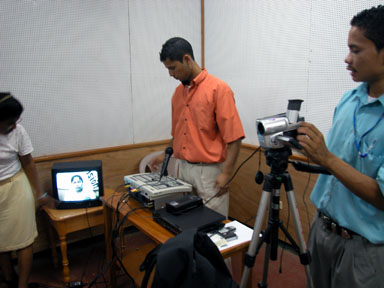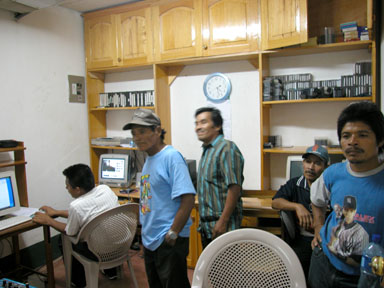|
BILWI COMMUNITY VIDEO
report, 2005
Community video is alive and well in Bilwi.
In May
2005 URACCAN, under the guidance of Margarita Antonio, signed a contract
with the Puerto Cabezas cable company to take over the local channel and
fill it with locally made programing. The channel now goes under the name
"BilwiVision". This is a welcome development in the evolution of URACCAN's
video presencce and indicates a recognition of the value of community access
in supporting its autonomy agenda, of opening community dialogue, and of
strengthening civil society.The project represents what might be one of
the first instances in Nicaragua of providing free community access to
television by ordinary people.
Since
taking over the channel Margarita and her volunteers have produced a daily
hour-long show every morning, with repetition in the late afternoon. The
shows includes segments with news, interviews, debates, health, variety,
women's issues, and sports. There is also a question of the day asked of
local citizens. There are summaries of news in Miskitu and English/creole.The
group also plans to produce 30 minute programs dedicated to one village
every week, showing its history, production, people, landscape, myths,
and so on.
 
Besides
its small group of regular producers, BilwiVision has put out the call
for more volunteers and a request for people from the communities to develop
their own programs. Margarita says her visit to Burlington, and especially
to Channel 17's Public Access facilities, are what inspired her vision
for this project.
Other former
members of our video workshops also continue to produce programs about
the region. Julio Bordas has completed five short documentary videos that
provide rich insight into the peoples of Nicaragua's Atlantic Coast. These
look at history and dance of the Garifuna, Miskito, Rama, Creole, and Mayagna
cultures. Anyone interested in obtaining copies should contact the Sister
City website.
Jimmy
Lopez continues to work with Myrna Cunningham to produce the weekly show
"Costena Agenda" which looks at various aspects of the autonomy process.
In addition to showing their program on BilwiVision, they send tapes to
Rosita, Bonanza, Pearl Lagoon, Bluefields, and Waspam for showing on those
cable channels.
During
a video workshop in September 2004 students
from URACCAN taped what their lives in the dormitory were like for showing
in Vermont.This winter students in Spanish classes at both the University
of Vermont and CVU highschools produced videos of their lives in
Vermont for sharing with their Nicaraguan counterparts. The Sister City
Program looks forward to video exchange as a way to let members of both
communities get to know each other's siter city.
The Sister
City Program continues its support for video training and community access
to television in Bilwi. Recording local stories and documenting life in
the region allows people to refelct on their own lives rather than just
act as consumers of mainstream television. It is empowering to both producers
and viewers. In addition to helping URACCAN with the occasional purchase
of cameras and computer editing equipment we would like to find a way to
help sustain- and perhaps expand- this vital program.
If anyone
has suggestions for granting opportunities please contact Dan Higgins through
the Sister City website.

To learn more about the URACCAN/ Sister
City Video Project check out reports from previous years.
|


